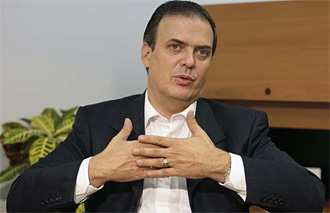
|  |  |  News Around the Republic of Mexico | May 2009 News Around the Republic of Mexico | May 2009  
Mexico City Mayor Eyes Presidential Run
 Alistair Bell - Reuters Alistair Bell - Reuters
go to original


| | Mexico City's Mayor Marcelo Ebrard talks during an interview with in Mexico City on Thursday. (Daniel Aguilar/Reuters) |  |
Mexico City — The popular mayor of Mexico City wants to run for president in 2012 with a leftist program to limit the power of big companies, help the poor and invest public money to kick-start stalled oil production.

Marcelo Ebrard, who has won praise for his handling of the swine flu crisis in the capital, told Reuters he was likely to be a candidate to replace conservative President Felipe Calderon when he steps down in 2012.

"Let's see in 2011. But I always say, 'Why not?"' he said.

Belying his image as a moderate, Ebrard said Mexico needs clearly left-wing policies to end nearly a decade of poor economic growth and help millions of poor.

"You can't have a left wing that's too centrist because then you don't represent the rest of the country. This idea that it's fashionable to be nice and agree on everything because that's the good thing to do has its limits," he said.

Mexico's economy is in a deep recession because of the world economic crisis and Calderon, a close ally of the United States, is struggling to defeat powerful drug cartels.

The country came close to taking a sharp turn to the left in 2006 when Ebrard's left-wing Party of the Democratic Revolution narrowly failed to win the presidency.

The party fell in popularity after losing candidate Andres Manuel Lopez Obrador launched weeks of disruptive protests in the middle of Mexico City to promote claims of electoral fraud.

But Ebrard, 49, a measured former police chief, has won support in the capital for leisure projects like setting up a massive ice rink in the central Zocalo square and opening the main Paseo de la Reforma to bicycle riders at the weekend.

He says he would clamp down on major Mexican companies like broadcaster Televisa and firms owned by tycoon Carlos Slim that are often criticized for stifling competition.

"They are capable of vetoing and promoting decisions in Congress and in government. That's a problem. I'd say they have to be limited quite severely," said Ebrard, speaking in a smart municipality office in the trendy La Condesa district.

He said monopolies in Mexico had prevented smaller companies from accessing the stock market.

Oil exports, which account for about a third of government revenue, are slumping as old fields run out of crude.

The constitution makes if difficult for state energy company Pemex to join with foreign partners to explore for oil in deep waters of the Gulf of Mexico.

Ebrard questioned the need for private cash in Mexico's treasured energy industry, nationalized in 1938.

"They say it's gone badly because we haven't opened it up. What guarantee is there that it'll be better if you open it up?" he said.

Pemex needs a management shake up, he said. "Yes, you can do much better in exploration and exploitation with the resources you have."

Ebrard said Calderon's strategy of sending tens of thousands of troops against drug cartels, particularly on the U.S. border, was not enough to win the drugs war.

"The less you have to use the army the better," he said. Drug cartels also need to be attacked by getting at their financial resources and educating young people, Ebrard said. |

 |
|  |



